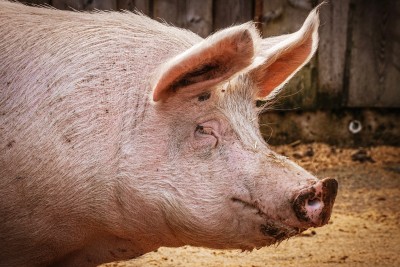Is Your Farm Ready to Prevent a Foreign Animal Disease?
Amy Barkley, Team Leader & Livestock Specialist
Southwest New York Dairy, Livestock and Field Crops Program

Is Your Farm Ready to Prevent a Foreign Animal Disease?
Nancy Glazier, CCE NWNY Dairy, Livestock & Field Crops Team
In late July an outbreak of African Swine Fever (ASF) was reported in the Dominican Republic in backyard pigs. Though ASF has been around for well over 100 years, this is its first appearance in nearly 40 years in the Western Hemisphere, according to the National Pork Producers Council. The disease has decimated many herds in Asia and Europe, as well as Africa where it is endemic.
At this time, it is unknown how it made the jump to the Dominican Republic, an island country. Many outbreaks were reportedly started with direct contact with feral pigs. Parts of Eastern Europe are dealing with outbreaks in wild boars. Large hunts have been approved in an attempt to control and prevent further spread to domestic pigs. The highly contagious disease can be spread through direct contact from pig to pig as well as indirect contact through contaminated equipment, feed, visitors, and employees. It is not transmissible to humans or other animals and is not a food safety issue.
African Swine Fever can spread quickly through herds; be familiar with signs of ASF:
- High fever
- Decreased appetite and weakness
- Red, blotchy skin or skin lesions
- Diarrhea and vomiting
- Coughing and difficulty breathing
There is no commercial vaccine available, though significant development is underway. Control is total herd depopulation of an operation to prevent further spread.
There are now tightened border controls at the US, Canadian, and Mexican borders. Travelers are screened entering the US on direct flights from the Dominican Republic. USDA is pursuing a protection zone in Puerto Rico to maintain the export market if ASF is detected in Puerto Rico.
If there were ever a foreign animal disease outbreak of any kind, quarantines would be established around the property for a specified radius. If your farm was in that area, you would not be allowed to ship animals, milk, or animal products out of the quarantine unless you had a continuity of business plan in place ahead of the outbreak. There are many resources that can be found here for swine if ASF is detected: https://www.securepork.org/. There is also information specific for outdoor production. Resources were developed through a collaboration between the swine industry, state and federal government officials, Iowa State University, and the University of Minnesota.
Biosecurity practices to be mindful of are good to prevent any disease outbreak.
- Make sure visitors have clean clothing and footwear when entering your property.
- Use proper disinfectants
- Limit outdoor exposure of domestic pigs to any feral hogs
- Control insects in and around operations
- Don't feed uncooked garbage, animal tissues, or waste products
We have seen during the pandemic how quickly viruses can spread. Farms of all sizes and production methods need to be mindful of biosecurity measures on their operations. If you want more information on biosecurity, please reach out to your local Cornell Cooperative Extension office. Just about every species has a checklist to assist with biosecurity, continuity of business plan, and ensure a safe food supply.
Upcoming Events
Boots in the Barn: Cornell Dairy Research Updates
January 13, 2026
January 20, 2026
January 27, 2026
February 3, 2026
February 10, 2026
February 17, 2026
February 24, 2026
Join us for some or all!
Deerworm and Flukes in Small Ruminants Webinar
February 25, 2026 : Deerworm and Flukes in Small Ruminants Webinar
Dr. Mary Smith from Cornell's College of Veterinary Medicine and Dr. Rachel White from UMaine Cooperative Extension will be discussing the lifecycles, signs, prevention, and management of deerworm and liver flukes in small ruminants.
NYSDEC How to Get Certified Course
March 3, 2026 : NYSDEC How to Get Certified Course
Ellicottville, NY
NYSDEC training course in preparation to take the pesticide applicator exam.
Announcements
Cows, Crops & Critters Newsletter Sponsorship
TRYING TO REACH GROWERS AND AGRIBUSINESSES IN OUR SOUTHWEST REGION OF NEW YORK?Weekly Email Update: Shared with 625+ households who have signed up with our program.
Monthly Paper Mailer: To reach our stakeholders and farmers who lack internet access, we send out a monthly mailer where your company's logo and contact information would be featured with a mailing list of 330+ households.
If you sponsor our weekly and monthly publications you reach approximately 955 households.





